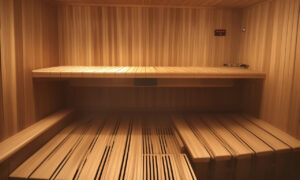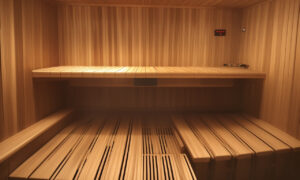In the quest for relaxation and rejuvenation, two timeless methods often take center stage: the sauna and the hot bath. Both are sanctuaries of warmth that promise to ease the body and calm the mind. But what sets them apart, and is one superior to the other? As we dive into the sauna vs hot bath debate, we’ll unveil the benefits and experiences unique to each, helping you embark on the path to utmost tranquility.
Understanding the Sauna: A Path to Nordic Bliss
The Tradition of Sauna Bathing
Saunas have been an integral part of various cultures, especially in Finland, where the tradition has deep roots running back thousands of years. Their popularity has spread globally, encapsulating the essential experience of dry heat sessions that promote relaxation, sweat, and an elevated sense of wellbeing.
The Health Benefits of Saunas
Stepping into the embrace of a sauna comes with a myriad of health advantages. The sauna offers more than just a retreat; it’s a wellness ritual that engenders both physical and emotional benefits:
Related article; how much water do you lose in a sauna
- Detoxification: Sweating in a sauna can flush out toxins, contributing to a purified system.
- Improved Circulation: The heat causes blood vessels to dilate, enhancing blood flow.
- Muscle Relaxation: The warmth helps to soothe aches and relieve muscle tension.
- Stress Relief: Saunas can stimulate the release of endorphins, creating a sense of relaxation.
- Skin Rejuvenation: Sweating opens up pores and can aid in clearing skin complexion.
Sauna Temperature: The Heat Is On
Saunas are characterized by their dry heat, typically ranging between 150°F and 195°F. This high temperature is vital to the sauna experience, fostering an environment that encourages profound sweating and heightened heart rates, akin to the effects of moderate exercise.
Related article; infrared sauna electricity cost
The Comfort of a Hot Bath: Your Personal Soaking Sanctuary
The Art of the Hot Bath
While the sauna offers a community experience, a hot bath is often a private haven. Baths have been cherished for centuries, offering a simple yet effective way to unwind after a long day. The soothing properties of hot water envelop the body, providing immediate relaxation.
Related article; should you shower after sauna
Advantages of a Hot Bath
Submerging in the warm waters of a hot bath extends beyond mere pleasure; it presents a treasure trove of benefits for the body and mind:
Related article; how long should i sit in sauna after workout
- Muscle Relaxation: Like the sauna, hot water can help alleviate muscle stiffness and soreness.
- Improved Sleep: A warm bath before bed can aid in falling asleep faster and improve sleep quality.
- Mental Well-being: The quiet solitude of a bath can be a meditative experience, reducing stress and anxiety.
- Better Respiration: The steam from a hot bath may help clear nasal passages, enhancing respiration.
Hot Bath Temperature: A Toasty Retreat
The ideal temperature for a hot bath is usually around 98°F to 104°F. This range is warm enough to provide therapeutic effects without causing discomfort or overheating.
Related article; optimal sauna temp
Sauna vs Hot Bath: The Detailed Comparison
When it comes to choosing between a sauna or a hot bath, it often boils down to personal preference. However, a closer look reveals distinct differences that might sway your choice.
Related article; shower sauna conversion kit
Heat Type and Its Impact
-
Sauna:
- Dry heat
- High temperatures (150°F to 195°F)
- Low humidity
-
Hot Bath:
- Moist heat
- Lower temperatures (98°F to 104°F)
- High humidity
Duration of Sessions
- Sauna: Sessions can last from 5 to 20 minutes, followed by a cooling-off period.
- Hot Bath: Soaking time varies based on personal comfort, but generally is between 15 to 30 minutes.
The Role of Hydration
Hydration is crucial for both the sauna and hot bath experiences. Due to intense sweating in a sauna, replenishing fluids is essential to maintain hydration levels. Similarly, staying hydrated before and after a hot bath helps the body regulate temperature and avoid dehydration.
Related article; when is the best time to sauna
Accessibility and Convenience
Owning a private sauna may be less common than having a bathtub at home. However, many gyms, spas, and health clubs provide sauna facilities, making it accessible to a broader audience. On the other hand, the hot bath remains a readily available option for most people, offering a quick and easy method to unwind.
Related article; sauna before or after cryotherapy
Crafting Your Ultimate Relaxation Strategy
Both the sauna and hot bath provide portals to relaxation, but integrating them into your self-care routine can optimize their benefits. Here’s how:
- Combine Both: Enjoying a sauna session followed by a lukewarm shower and then soaking in a hot bath can offer a full spectrum of relaxation and health benefits.
- Listen to Your Body: Pay attention to how your body responds to the heat in both environments, and modify your sessions accordingly.
- Customize Your Experience: Add essential oils, bath salts, or sauna aromatherapy to enhance the sensory experience.
Sauna vs Hot Bath: The Verdict
Ultimately, choosing between a sauna and a hot bath is a personal decision. The sauna provides an invigorating burst of dry heat that invigorates the body and has distinct health benefits, particularly in the realm of improved circulation and deep cleansing through sweating. A hot bath, on the other hand, offers a nurturing escape, an intimate moment of solitude, and a treasure of warmth that can ease you into a state of peacefulness.
As you navigate the waters of relaxation, remember that both the sauna and the hot bath are time-honored practices that cater to the universal longing for calm and contentment. Whichever you choose, you’re sure to emerge renewed, refreshed, and ready to face the world with newfound serenity.




